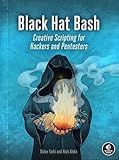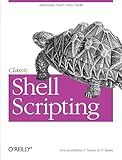Best Bash Scripting Books to Buy in March 2026

Black Hat Bash: Creative Scripting for Hackers and Pentesters



The Ultimate Linux Shell Scripting Guide: Automate, Optimize, and Empower tasks with Linux Shell Scripting



Learning the bash Shell: Unix Shell Programming (In a Nutshell (O'Reilly))
- AFFORDABLE PRICES ON QUALITY PRE-OWNED BOOKS.
- ECO-FRIENDLY CHOICE SUPPORTS RECYCLING AND SAVING TREES.
- UNIQUE FINDS: DISCOVER RARE TITLES IN GREAT CONDITION.



Bash Pocket Reference: Help for Power Users and Sys Admins



Shell Scripting: How to Automate Command Line Tasks Using Bash Scripting and Shell Programming



Classic Shell Scripting



Scripting: Automation with Bash, PowerShell, and Python—Automate Everyday IT Tasks from Backups to Web Scraping in Just a Few Lines of Code (Rheinwerk Computing)


In Bash, you can use the "if then" conditional statement to perform specific actions based on certain conditions. The syntax of the "if then" statement in Bash is as follows:
if condition then
code to be executed if the condition is true
else
code to be executed if the condition is false
fi
Here's a breakdown of each component:
- The if keyword indicates the start of the conditional statement.
- condition represents the expression that will be evaluated to either true or false.
- The then keyword marks the beginning of the code block to be executed if the condition is true.
- The code inside the then block is indented and typically consists of one or more Bash commands or script lines.
- The else keyword is optional. If provided, it denotes the alternate code block to be executed if the condition is false.
- The code inside the else block is executed when the condition evaluates to false.
- The fi keyword marks the end of the conditional statement.
Here's an example demonstrating the usage of "if then" in Bash:
#!/bin/bash
read -p "Enter a number: " num
if ((num > 0)) then echo "The number is positive." else echo "The number is either zero or negative." fi
In this example, the script prompts the user to enter a number. If the entered number is greater than zero, it displays the message "The number is positive." If the number is zero or negative, it outputs "The number is either zero or negative."
Remember, when using numerical comparisons in Bash, it is recommended to use double parentheses (()) to indicate arithmetic evaluation.
Feel free to ask if you have any specific queries or further questions!
What is the difference between single and double quotes in if conditions in bash?
In Bash, single quotes (' ') and double quotes (" ") are used to define strings. However, there is a difference between how they are interpreted in if conditions.
- Single quotes (' '): When a string is enclosed in single quotes, the content inside is treated as a literal string, and no interpretation or expansion of variables or special characters occurs. For example: string='hello world' if [ "$string" == 'hello world' ]; then echo "Condition is true" fi In the above code snippet, the condition will evaluate to true since the string inside the single quotes matches the original string.
- Double quotes (" "): When a string is enclosed in double quotes, variables and special characters within the string are expanded and interpreted. For example: string='hello world' if [ "$string" == "hello world" ]; then echo "Condition is true" fi In this case, the condition will also evaluate to true because the double quotes allow the variable expansion to occur before comparison.
In general, it is recommended to use double quotes in if conditions when dealing with string comparisons to ensure proper variable expansion and interpretation of special characters.
How to use the case statement instead of if-else in bash?
To use the case statement instead of if-else in Bash, you can follow these steps:
- Start by writing the case keyword followed by the variable or value you want to compare.
- Use the in keyword to specify the possible values to compare against.
- List the possible values, separating them with vertical bars |.
- After each possible value, use the ) symbol and write the code block to be executed when that value matches the variable or value being compared.
- End each code block with the ;; statement.
Here's an example that demonstrates how to use the case statement instead of an if-else statement in Bash:
#!/bin/bash
animal="dog"
case $animal in "cat") echo "The animal is a cat." ;; "dog") echo "The animal is a dog." ;; "bird") echo "The animal is a bird." ;; *) echo "The animal is unknown." ;; esac
In this example, the case statement checks the value of the animal variable. If it matches any of the listed values ("cat", "dog", "bird"), it executes the corresponding code block. If none of the values match, the asterisk * acts as a wildcard and executes the code block under *).
When this script is executed, it will output:
The animal is a dog.
You can modify this example to suit your specific use case by changing the variable and values to match your requirements.
What is the syntax for using logical operators in if conditions in bash?
The syntax for using logical operators in if conditions in Bash is as follows:
if [ condition1 ] && [ condition2 ] then # statements to be executed if both conditions are true fi
if [ condition1 ] || [ condition2 ] then # statements to be executed if either condition1 or condition2 is true fi
In the above syntax, condition1 and condition2 are the expressions or commands that return a status of 0 (true) or non-zero (false) when executed. [ and ] are used for command substitution and to enclose the conditions. The && (logical AND) and || (logical OR) operators are used for combining the conditions based on your requirements.
How to do string comparison in an if statement in bash?
In bash, you can use the == operator to compare strings inside an if statement. Here is an example:
#!/bin/bash
string1="Hello" string2="World"
if [ "$string1" == "$string2" ]; then echo "Strings are equal" else echo "Strings are not equal" fi
In the above example, the if statement compares string1 and string2 to check if they are equal. If they are equal, it will output "Strings are equal", otherwise it will output "Strings are not equal".
Note that for string comparison in an if statement, the variables should be enclosed in double quotes to account for cases where the strings contain spaces or special characters.
